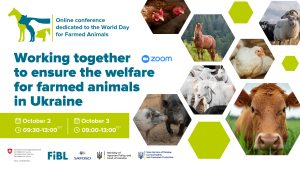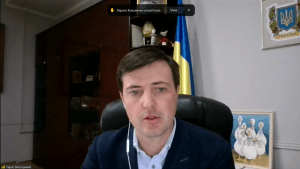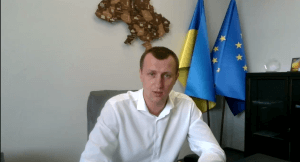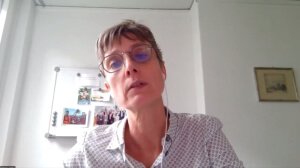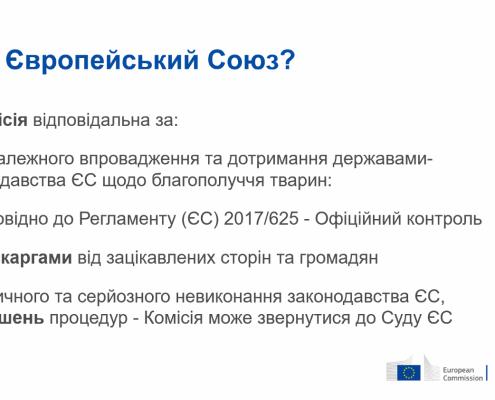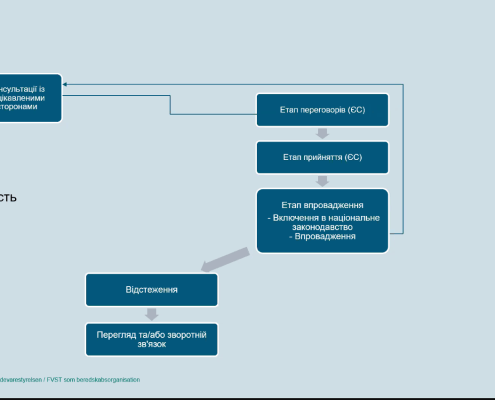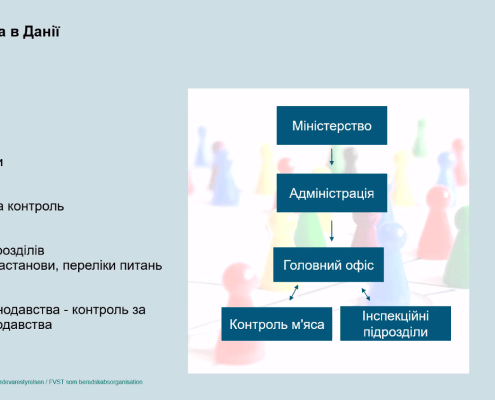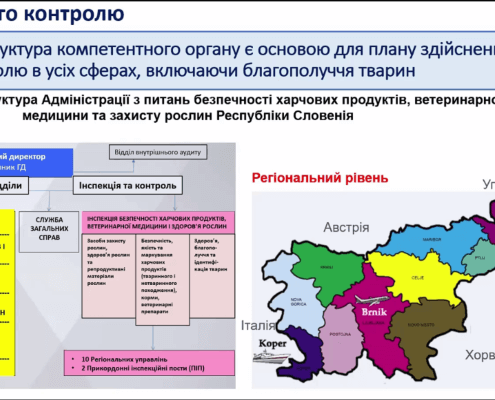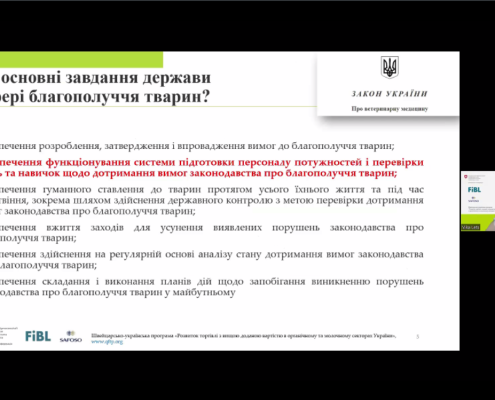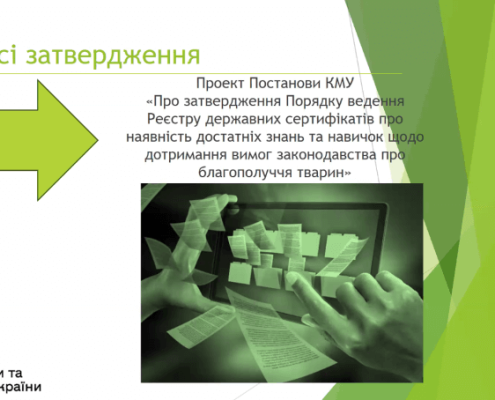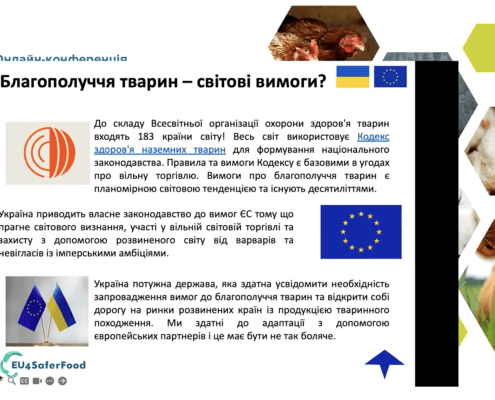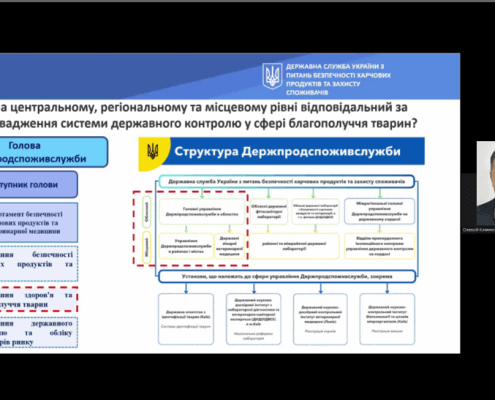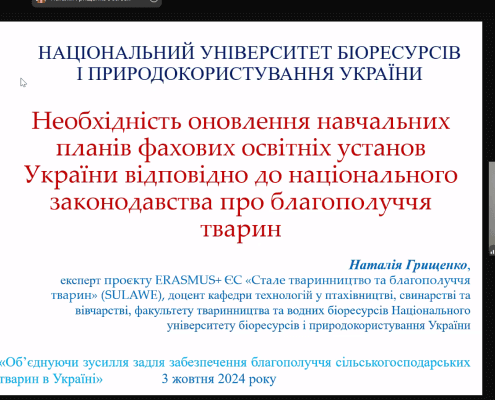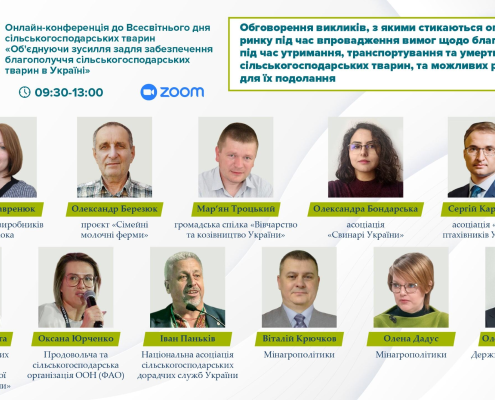Ukraine on the way to the EU: harmonization of welfare standards for farmed animals On 2-3 October 2024, an online conference dedicated to the World Day for Farmed Animals “Working together to ensure the welfare for farmed animals in Ukraine” was held. The aim of the event is to raise awareness of the importance of harmonizing national legislation on the welfare of farmed animals to EU requirements, and implementing animal welfare rules during the keeping, killing, and transporting of farmed animals; the importance of establishing an effective state control system on compliance with these requirements for European integration and the development of international trade. The event was attended by more than 350 participants, including representatives of the Ministry of Agrarian Policy and Food of Ukraine (MAPF), the State Service of Ukraine on Food Safety and Consumer Protection (SSUFSCP) at central and regional levels, business associations, specialists from livestock farms and other business operators, international technical assistance projects in the field of animal health and welfare. Taras Vysotskyi, First Deputy Minister of Agrarian Policy and Food of Ukraine, in his welcoming remarks stressed that animal welfare is an important aspect of EU agricultural policy and is of key importance for the Ukrainian agricultural sector. «Ukraine has made a clear choice and is steadily moving towards EU membership, realizing the need to implement the strategic policy directions implemented in the EU, including the welfare of farmed animals. Therefore, it is now extremely important to bring legislation in line with European requirements, conduct training and extensive information campaigns for SSUFSCP inspectors and business operators», he said.
Sergiy Tkachuk, Head of the State Service of Ukraine on Food Safety and Consumer Protection, noted that the welfare of farmed animals is a key element of food chain safety, given the close link between animal welfare, health and foodborne diseases. «Most of the focus in Ukraine is on the health of farmed animals as a key element of a controlled epizootic situation. However, animal welfare is an indicator of economic development. In addition, it should be borne in mind that the standards of farmed animal welfare in the EU countries are higher than in Ukraine. Changes in the conditions for keeping farmed animals will affect the ability of Ukrainian producers to enter European markets. Therefore, the next step is to effectively implement animal welfare requirements in our country in line with those in Europe. And this can be done by combining the efforts of the executive authorities, business associations, the public, business and international partners», he summed up.
Manon Schuppers, International Expert of the Dairy Sector Component, Swiss-Ukrainian Program “Higher Value Added Trade from the Organic and Dairy Sector in Ukraine” (QFTP), Co-CEO SAFOSO AG, also emphasized that consumers around the world are increasingly expecting livestock producers to ensure certain standards of animal welfare during their production. «We recognize that animal welfare is still a fairly new topic in Ukraine. QFTP has a long experience in advising on the harmonization of Ukrainian legislation with EU requirements. Our team does this by sharing information and organizing training for different target groups. We would like to take this opportunity on World Day for Farmed Animals to discuss EU animal welfare rules and standards, as well as the challenges related to this topic in Ukraine», she said.
During the first session, “Regulatory framework and EU experience in ensuring the welfare of farmed animals” Stanislav Ralchev, Policy Officer of the Unit Animal Welfare of European Commission – DG SANTE, provided an explanation of the European organisational and legal framework for welfare of farmed animals, including current requirements and expected changes in legislation. Anja Putzer, Senior Advisor and Lærke Edel Toft Holm, Academic Worker of the Office for Animal Welfare of the Danish Veterinary and Food Administration, Ministry of Food, Agriculture and Fisheries of Denmark, presented the institutional structure, experience and challenges in implementation of legal rules on welfare of farmed animals in Denmark.. Andreja Bizjak, Former Director of the Inspection for Food Safety, Veterinary Medicine and Plant Protection of the Republic of Slovenia, spoke about Slovenia’s experience in organizing and implementing official controls on welfare of farmed animals at the level of an EU Member State. During the second session of the conference, national experts presented on important aspects of Ukraine’s path to ensuring the welfare of farmed animals. Vitalii Kryuchkov, Head of the Unit for Veterinary Medicine and Animal Welfare of the Department of State Policy in the Field of Sanitary and Phytosanitary Measures and Food Security, MAPF, presented the current status of harmonization of the national legislation regarding welfare of farmed animals to EU requirements. Vitaliy Bashynskyi, Senior Non-key Veterinary Expert, EU Project “Continued Support to align Ukrainian legislation, control and awareness with EU acquis in food safety, animal health and welfare, and phytosanitary’’ (EU4SaferFood), highlighted the key responsibilities of business operators that keep, transport and slaughter farmed animals. Viktoria Lets, Senior National Expert of the Dairy Sector Component, QFTP, spoke about the training system of the staff involved in the keeping, transporting and killing of farmed animals on the requirements of animal welfare legislation. Oleksii Klymenok, Head of the Animal Health and Welfare Unit of the Directorate of Animal Health and Welfare, Organization of AntiEpizootic Measures of the Department of Food Safety and Veterinary Medicine, SSUFSCP, analyzed the сurrent status of the implementation of the official control system on farmed animals’ welfare in Ukraine. Nataliia Hryshchenko, expert of ERASMUS+ EU project Sustainable Livestock Production and Animal Welfare (SULAWE), Associate Professor of the Department of Technologies in Poultry, Pig and Sheep Breeding, Faculty of Animal Husbandry and Aquatic Bioresources of the National University of Life and Environmental Sciences of Ukraine, presented the vision of the academic community on the need to update curricula of professional educational institutions of Ukraine according to national legislation on animal welfare. In conclusion, representatives of business unions and associations with experts from MAPF and SSUFSCP discussed the challenges faced by bussines operators in implementing welfare requirements during the keeping, transportation and slaughter of farmed animals and possible solutions to overcome them. QFTP experts will continue to support MAPF and SSUFSCP in harmonizing national legislation, developing the necessary tools and developing institutional capacity to implement welfare requirements for farmed animals. The presentation materials of the event are available on the QFTP website in the section “Training Materials: Policy Dialog and Legislation”. The video of the event is available here: Session 1 and Session 2 (in Ukrainian only). You can find infographics on the requirements for the welfare of farmed animals during their keeping below. Requirements for the welfare of calves during their keeping (available in Ukrainian only) Requirements for the welfare of dairy cows during their keeping (available in Ukrainian only) Requirements for the welfare of farmed animals during their keeping (available in Ukrainian only) This event is supported by Switzerland within the framework of the Swiss-Ukrainian Program “Higher Value Added Trade from the Organic and Dairy Sectors in Ukraine” implemented by the Research Institute of Organic Agriculture (FiBL, Switzerland) in partnership with SAFOSO AG (Switzerland), in cooperation with Ministry of Agrarian Policy and Food of Ukraine and State Service of Ukraine on Food Safety and Consumer Protection.
